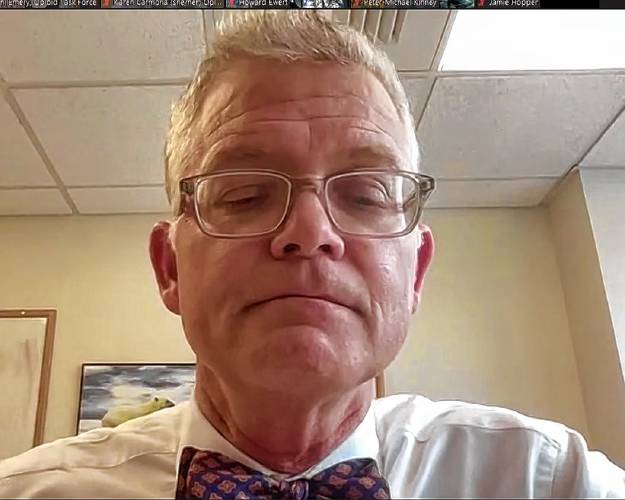‘Every overdose death is preventable’: BU professor details local impact of HEALing Communities Study

The Opioid Task Force of Franklin County and the North Quabbin Region hosted a Zoom session this week and invited Dr. Alexander Walley, a Boston University School of Medicine associate professor, to review the findings of the HEALing Communities Study that took place in 67 communities in Kentucky, Massachusetts, New York, and Ohio — four states hard hit by the opioid crisis. SCREENSHOT
| Published: 10-25-2024 3:54 PM |
The addiction prevention and treatment implementation study billed as the largest ever conducted found a decrease in perceived stigma toward people treated for opioid use disorder but no difference in stigma toward naloxone.
Launched in 2019, the HEALing Communities Study took place in 67 communities in Kentucky, Massachusetts, New York and Ohio — four states hard hit by the opioid crisis — and its findings will help establish best practices for integrating prevention and treatment strategies that can be adapted by communities nationwide. The Opioid Task Force of Franklin County and the North Quabbin Region hosted a Zoom session this week and invited Dr. Alexander Walley, a Boston University School of Medicine associate professor, to review the findings and explain what was learned from Greenfield, Montague, Orange and Athol.
“We can never do enough, when so many people are dying,” he said.
Walley mentioned Communities That HEAL (CTH) intervention holds the potential to decrease stigma surrounding opioid use disorder. CTH intervention was created by a team of opioid-overdose reduction experts from academic and medical institutions in the four states where the Healing Communities Study took place. Walley reported that 1,655 naloxone kits were distributed in the four local municipalities involved. Naloxone is a medicine that rapidly reverses an opioid overdose.
Statistics show opioid overdose deaths in Massachusetts decreased in 2023 following an all-time high in 2022.
“These improvements are good to see but, also, we are not where we want to be,” Walley said. “Every overdose death is preventable.”
The doctor recommended harm reduction services, including increased naloxone availability through organizations such as Tapestry Health and maintaining naloxone cabinets in areas of high need. Other strategies include peer distribution, pharmacy distribution and distribution by responding EMTs.
Walley encouraged the Zoom session’s attendees to contact their Congressional representatives to tell them to support the Modernizing Opioid Treatment Access (MODA) Act, which would expand access to methadone for a person’s unsupervised use to treat opioid use disorder. Methadone, a daily medical liquid approved by the U.S. Food and Drug Administration to treat opioid use disorder, typically must be dispensed to individuals in person through opioid treatment programs. This can be highly prohibitive to people struggling with addiction who live in more rural areas. The bill was introduced by U.S. Sen. Ed Markey. Walley said Canada, Australia and other countries are far less restrictive of methadone and have seen great results.
Article continues after...
Yesterday's Most Read Articles
He also mentioned an increasing, but unknown, number of people who do not have opioid use disorder are overdosing due to fentanyl contamination of cocaine, methamphetamine and counterfeit prescription pills. Fentanyl is a powerful synthetic opioid similar to morphine but 50 to 100 times more potent. Walley said there needs to be outreach to users of non-opioid drugs to warn them of this increasing danger.
Reach Domenic Poli at: dpoli@recorder.com or 413-930-4120.






 ‘It’s a Wonderful Night in Turners Falls’ showcases village businesses, nonprofits
‘It’s a Wonderful Night in Turners Falls’ showcases village businesses, nonprofits Sackrey Construction Co. of Sunderland celebrating 35 years in business
Sackrey Construction Co. of Sunderland celebrating 35 years in business Photo: As darkness falls
Photo: As darkness falls Leverett residents rap Kittredge compound plans, urge caution as negotiations for 400 homes move forward
Leverett residents rap Kittredge compound plans, urge caution as negotiations for 400 homes move forward 
